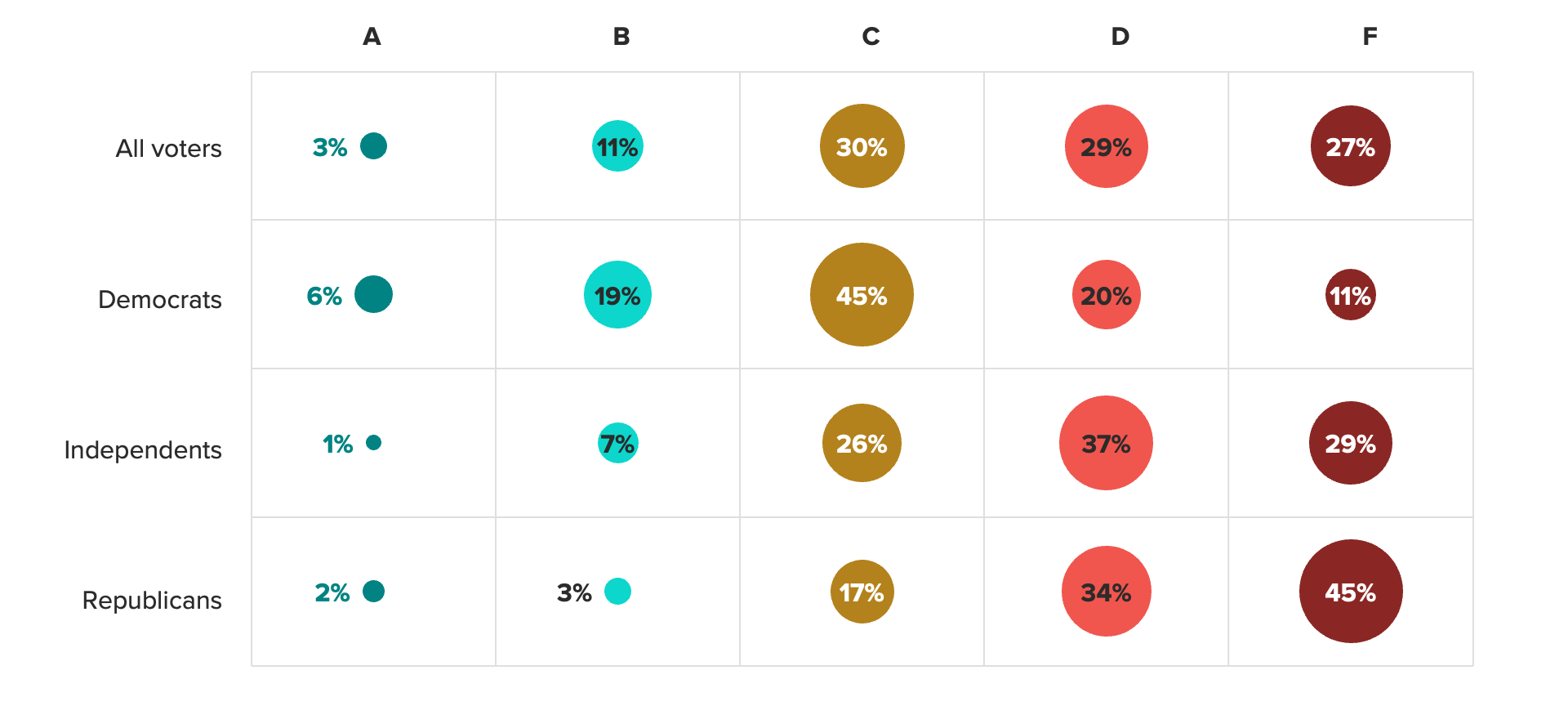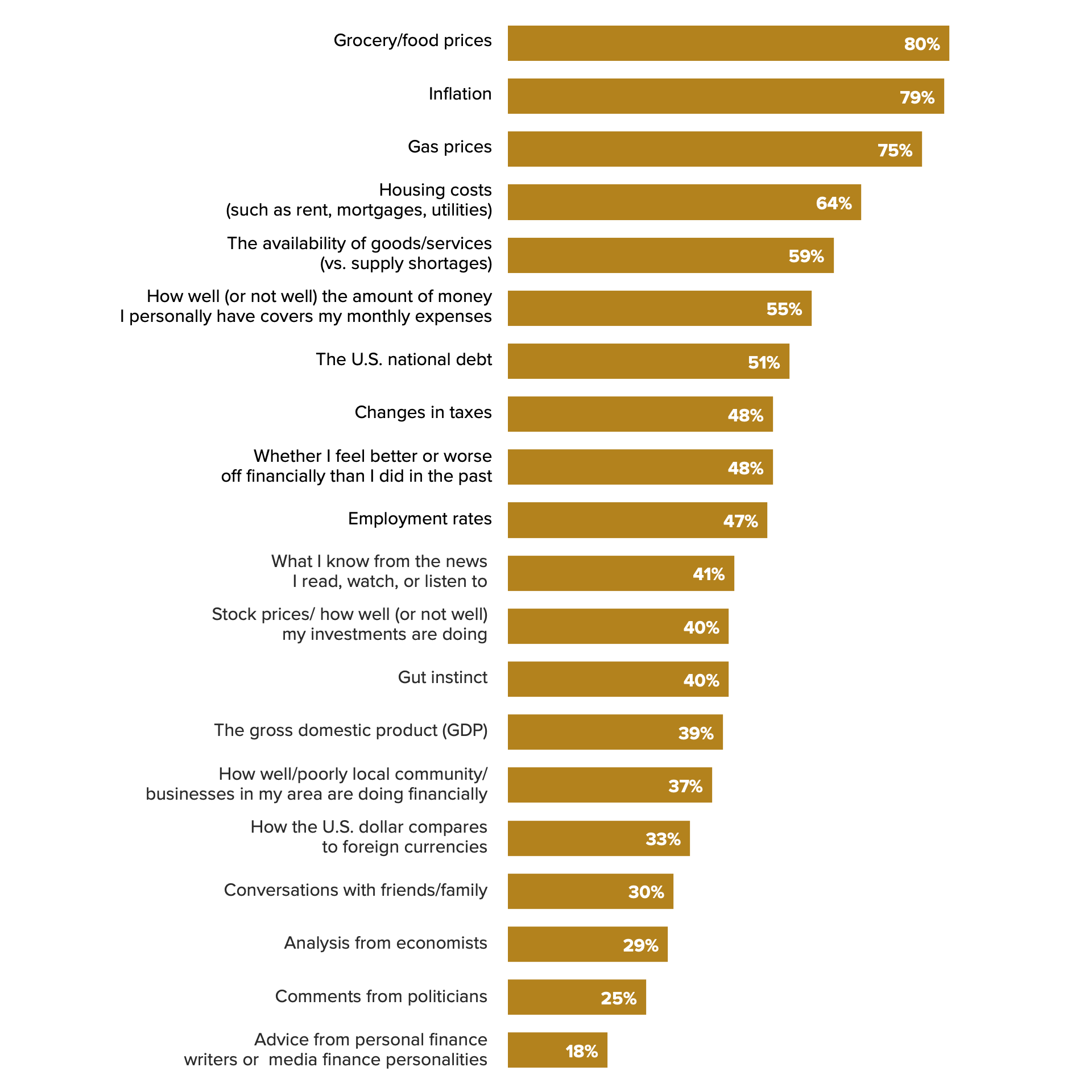Ahead of Midterm Elections, Most Voters Give the U.S. Economy a Dismal Grade

Key Takeaways
7 in 10 Democrats give the current U.S. economy a grade of A, B or C, while about 1 in 5 Republicans and 1 in 3 independents said the same.
When asked what influenced the grade they gave the economy, 80% of voters said food prices played a major role in their decision, followed by inflation (79%) and gasoline prices (75%).
Morning Consult’s Consumer Confidence Index shows that consumer sentiment has been lower in recent weeks than it was during the COVID-19 lockdown in 2020, during which the economy saw higher rates of unemployment and an actual recession.
When it comes to deciding whether the U.S. economy is flourishing or floundering, most voters look at how far their money goes when spending on everyday needs like food, gasoline and housing, according to new Morning Consult data.
In a survey conducted in the week leading up to the midterm elections, voters were most likely to give the current economy a bad grade, with 56% assigning a D or F, including about 4 in 5 Republicans, 2 in 3 independents and 3 in 10 Democrats.
About 7 in 10 Democrats gave the current U.S. economy a rosier grade of A, B or C, while about 1 in 5 Republicans and 1 in 3 independents said the same. Though Democrats were the most generous group when it came to grading the economy, only 6% of Democrats awarded the economy an A, and those voters have expressed an increasingly dismal outlook in the past year.
Most Voters Give the U.S. Economy a Dismal Grade of D or F

Inflation sours voters’ view of an expanding economy and a strong job market
Even as the economy continues to add jobs and the United States has yet to officially enter a recession, few voters gave the economy high marks.
Morning Consult economic analyst Jesse Wheeler said he believes the negative outlook may have to do with the nature of high prices. “Inflation is felt by everyone. And employment losses are felt by a relatively smaller percentage of the population,” he said.
Wheeler said that “almost all economists would agree” that the country is not in a recession, but as consumers pay more for necessary staples, wages may not keep up with the price of the goods, making people feel like they are “going in reverse.”
He also noted that Morning Consult’s Consumer Confidence Index has been lower in recent weeks than it was during the early days of the COVID-19 pandemic and lockdowns, which saw much higher unemployment levels compared to the present and a recession.
Factors that hit consumers directly in their wallets topped the list of issues that voters said played a “major role” in the grade they gave the economy. Subjective measures also played a role in their grading: Whether voters feel better or worse off financially than in the past tied for eighth on the list, with 48% saying that played a major role in their assessment.
Inflation, Food and Gas Prices Are the Biggest Factors in How Voters Assess the U.S. Economy

Commentary and analysis from politicians, economists and media finance personalities were at the bottom of the list of influences that voters said played a major role in determining a grade for the economy. Information gleaned from consuming news ranked higher but also fell short of the top 10 list: 41% of voters said what they learn from reading, watching or listening to news played a major role in their grade.
For at least one voter, a millennial male Democrat who gave the economy a B, following the news only confused him further on the state of the economy. In the open-ended response portion of the survey asking people why they came up with the grade they did, he said he was unsure of what grade to give, saying, “I follow the news fairly closely and it seems like unemployment is low, but inflation is high.”
Among the open-ended responses, “inflation” was the most-mentioned factor, followed by “gas prices.”
A Gen X female Democrat who gave the economy a grade of D wrote, “My goodness the price of food, milk, eggs, butter, gas, rent and more. Help.” Another voter, a millennial Democrat who assigned the economy a C grade, said his “salary is not catching up with increased costs of living.”
Not all voters had a gloomy outlook. “I think that our best days are ahead,” a male millennial Democrat who gave the economy a B, wrote, while another respondent, a Democrat female baby boomer who gave the economy a C, said, “I think the economy will get better. It will take time.”
A fair share of respondents took the opportunity to express their displeasure with the job President Joe Biden is doing. About 130 respondents mentioned the president in their open-ended responses, and among those, 70 were negative comments coming from people who mostly rated the economy as a D or F.
Several voters also pinned the current state of gas prices directly on the president. “When Biden cut off the supply of oil it destroyed the economy,” wrote a male Republican over 65 who gave the economy a D. A female millennial Republican who gave the economy a C said that “the price of gas is outrageous. And inflation has gone up 40% since Biden took office. He needs to go.”
Voters’ fixation on gas prices is not lost on the White House, and ahead of the midterms, the Biden administration has tried to demonstrate that it is taking proactive measures to drive down fuel costs, including releases from the Strategic Petroleum Reserve, promoting a global oil price cap and threatening oil companies with a windfall tax amid their record profits if they don’t increase oil production.
Other voters blamed both sides of Washington: “It’s a constant power struggle between Democrats and Republicans so very few positive changes can be implemented,” an independent Gen X woman who gave the economy a C grade wrote.
Amanda Jacobson Snyder previously worked at Morning Consult as a data reporter covering finance.